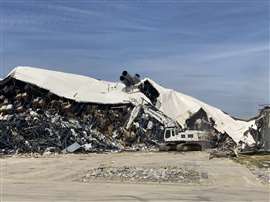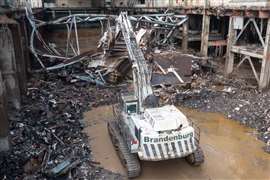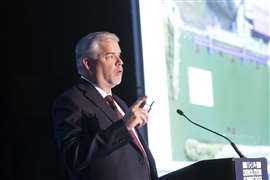Disaster on the jobsite: addressing tornado damage with precision and safety
27 November 2024
On 19 July 2023, an EF3 tornado struck the Ramboll Group/Pfizer Rocky Mount manufacturing facility in North Carolina, causing unprecedented damage to one of the largest sterile injectable production sites in the world.
 Destroyed: the tornado devasted the Pfizer facility, but fortunately no lives were lost. (PHOTO: Brandenburg)
Destroyed: the tornado devasted the Pfizer facility, but fortunately no lives were lost. (PHOTO: Brandenburg)
With winds reaching up to 150 mph, the tornado left two key warehouse buildings—High Bay Warehouse Building 500 (86,000 square feet) and Low Bay Warehouse Building 501 (50,000 square feet)—unsafe or destroyed.
The timing was critical; the facility plays a vital role in manufacturing low-cost, generic sterile injectables, which at the time, were already in short supply nationwide. Immediate action was required to clear the debris and begin the path toward recovery.
Brandenburg’s Immediate Response
When the tornado struck, Brandenburg Industrial Service Company was already engaged in complex selective dismantling and demolition work at the Rocky Mount site.
The company’s rapid mobilisation and commitment to safety proved instrumental. The team’s previous emergency preparedness training – undertaken as part of its initial demolition project at the facility, played a crucial role in ensuring that workers on-site remained safe during the tornado.
In the aftermath, Brandenburg’s expertise in complex and high-risk projects became apparent. The company’s approach combined careful planning, robust safety measures, and a deep understanding of structural hazards. Their efforts were recognised by Pfizer as vital to stabilising the site and facilitating the eventual rebuilding process.
Comprehensive Safety Measures
The first step in Brandenburg’s process was to conduct an Engineering Survey to assess the structural integrity of the damaged buildings.
Senior personnel, including estimators, environmental managers, and operations team leaders, collaborated to identify risks such as unplanned collapses. This survey informed every subsequent action, prioritising the safety of all personnel involved.
Brandenburg also developed a site-specific Health & Safety Plan (HASP) that adhered to Pfizer’s stringent requirements and local, state, and federal regulations.
The HASP addressed a range of challenges, from exposure to hazardous materials to ensuring safe navigation through debris fields. It included administrative requirements, emergency action plans, and detailed protocols for chemical hazards.
Utility isolation was another critical step. Brandenburg’s team meticulously identified, colour-coded, and air-gapped all piping, electrical systems, and communication circuits.
This surgical process ensured that demolition activities would not inadvertently endanger workers or compromise remaining operational infrastructure.
Facts & Numbers
• Tornado damaged buildings totalled 136,000 sq ft and over 40,000 pallets of pharmaceutical products
• Working around damaged and destroyed products posed a unique challenge due to potential opioid exposure
• Brandenburg’s safety planning initiatives included working with Occupational Health Supplier to ensure training and access to Narcan
• Projects were performed concurrently and were completed with 63,000 work hours and zero recordable injuries or impact to the environment.
Addressing Unique Hazards
One of the most significant challenges was posed by the presence of damaged pharmaceutical products, including opioids. These products, scattered across the site, created a unique safety risk due to potential exposure.
To mitigate this, Brandenburg collaborated with occupational health providers to develop proactive measures. Narcan was made available on-site, and all employees received training in its application. This preparation ensured that workers were equipped to handle any exposure incidents safely.
The company’s Job Safety Analyses (JSAs) further reinforced its commitment to safety. JSAs were developed for each task, including battery storage removal, hazardous waste handling, and selective equipment dismantling.
These analyses outlined potential risks and safe work methods, with all crew members briefed before each task began. Real-time updates to the JSAs allowed the team to adapt to changing conditions and incorporate feedback from workers on the ground.
The use of Safety Task Analysis Cards (STACs) provided an additional layer of oversight. Workers used these cards to document the steps of their tasks and identify associated hazards, ensuring a systematic approach to risk management. This process not only enhanced safety but also fostered a culture of accountability and continuous improvement.
Precision Execution Under Pressure
The selective demolition of the Pfizer facility required precision and care. The High Bay Warehouse, which housed over 40,000 pallets of packaging supplies and finished goods, had suffered the most extensive damage. Brandenburg’s team undertook the painstaking process of clearing the site while preserving any salvageable materials.
Tasks included dismantling damaged structures, removing hazardous waste, and constructing temporary barriers to stabilise remaining buildings. Each activity was executed with a focus on safety, efficiency, and environmental responsibility.
Despite the complexity of the project, Brandenburg completed over 63,000 man-hours of work without a single recordable injury. The team’s efforts were completed on time and within budget, ensuring no further delays to Pfizer’s recovery efforts.
Collaboration in an Emergency Response
Brandenburg’s success at the Rocky Mount site was not achieved in isolation. The company worked closely with Pfizer representatives, local authorities, and regulatory agencies to ensure compliance and coordination.
This collaboration extended to the development of Method Statements, which outlined the step-by-step procedures for high-risk activities.
Method Statements were complemented by real-time feedback mechanisms, allowing workers to suggest improvements and adjust plans as needed. This iterative approach ensured that all activities met the highest safety standards while remaining adaptable to unforeseen challenges.
The emergency demolition of Pfizer’s Rocky Mount facility, which demonstrated meticulous planning and execution, stands as a testament to the importance of preparation, expertise, and collaboration in the face of disaster.
As industries continues to face challenges from natural disasters, projects like this highlight the critical role of skilled demolition teams in supporting recovery efforts.
CONNECT WITH THE TEAM











